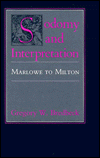The GLBTRT has been reviewing books and movies in its newsletter since the early 1990s. Trace the evolution of queer publishing through these historic reviews. This review was originally published in Vol. 4, No. 2, Summer 1992.
“Sodomite” is a word dark, repugnant, and forbidding not only to society at large but also to many gays and lesbians. Bradbeck, in this scholarly study, looks at the concept of sodomy as it evolved in Renaissance England from 1590 to 1660. The earliest construct of sodomy entailed witchcraft, heresy, paganism, atheism, sedition, and sexual aberrations; it was not until the close of the Renaissance that sodomy came to denote a narrow range of sexual behavior. The scholars of the period utilized the terms sodomy or sodomite synonymously with homoeroticism or homosexuality. In addition to this inherent research problem, in the sixteenth and seventeenth century the conceptualization of gay and lesbian identity did not exist. Employing a deconstructive criticism standpoint, Bredbeck analyzes the writings of Renaissance authors Barnfield, Drayton, Johnson, Marlowe, Milton, and Shakespeare, along with related legal and broadside material of the period.
In his interpretation of the historical context of homosexuality, Bredbeck further utilizes the work of contemporary theorists such as Hocquengam, Foucault, Althusser, Fristeva, Deluze, and Guttari. While Sodomy and Interpretation is a difficult read, its scholarly value cannot be denied. Along with works such as Bray’s Homosexuality in Renaissance England, Saslow’s Banymede in the Renaissance, and Smith’s Homosexual Desire in Shakespeare’s England: A Cultural Poetics, this work will form a core resource for gay/lesbian academic research for the Renaissance period. It will have broad applications beyond Renaissance scholars to also include gender theorists, gay and lesbian scholars, and academicians in the field of homosexual history.
Reviewed by Michael A. Lutes
University of Notre Dame
Notre Dame, IN

